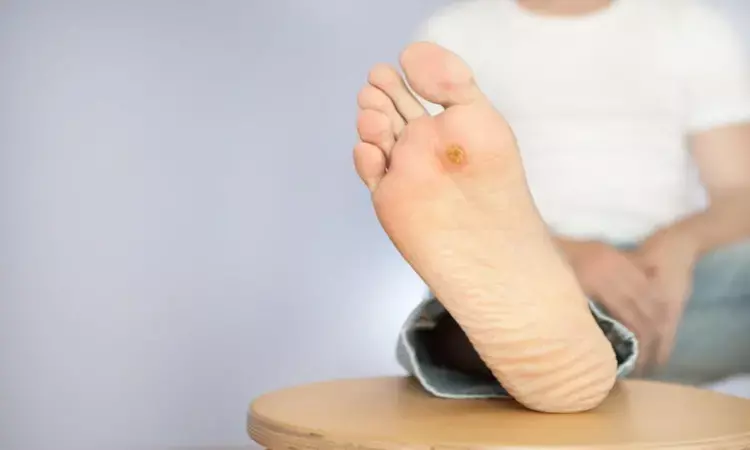- Home
- Medical news & Guidelines
- Anesthesiology
- Cardiology and CTVS
- Critical Care
- Dentistry
- Dermatology
- Diabetes and Endocrinology
- ENT
- Gastroenterology
- Medicine
- Nephrology
- Neurology
- Obstretics-Gynaecology
- Oncology
- Ophthalmology
- Orthopaedics
- Pediatrics-Neonatology
- Psychiatry
- Pulmonology
- Radiology
- Surgery
- Urology
- Laboratory Medicine
- Diet
- Nursing
- Paramedical
- Physiotherapy
- Health news
- Fact Check
- Bone Health Fact Check
- Brain Health Fact Check
- Cancer Related Fact Check
- Child Care Fact Check
- Dental and oral health fact check
- Diabetes and metabolic health fact check
- Diet and Nutrition Fact Check
- Eye and ENT Care Fact Check
- Fitness fact check
- Gut health fact check
- Heart health fact check
- Kidney health fact check
- Medical education fact check
- Men's health fact check
- Respiratory fact check
- Skin and hair care fact check
- Vaccine and Immunization fact check
- Women's health fact check
- AYUSH
- State News
- Andaman and Nicobar Islands
- Andhra Pradesh
- Arunachal Pradesh
- Assam
- Bihar
- Chandigarh
- Chattisgarh
- Dadra and Nagar Haveli
- Daman and Diu
- Delhi
- Goa
- Gujarat
- Haryana
- Himachal Pradesh
- Jammu & Kashmir
- Jharkhand
- Karnataka
- Kerala
- Ladakh
- Lakshadweep
- Madhya Pradesh
- Maharashtra
- Manipur
- Meghalaya
- Mizoram
- Nagaland
- Odisha
- Puducherry
- Punjab
- Rajasthan
- Sikkim
- Tamil Nadu
- Telangana
- Tripura
- Uttar Pradesh
- Uttrakhand
- West Bengal
- Medical Education
- Industry
Diagnosis and treatment of diabetes-related foot infections: New guidelines by IWGDF

USA: The International Working Group on the Diabetic Foot (IWGDF) has released recent evidence-based guidelines on the management and prevention of diabetes-related foot infections.
The guideline, published in Diabetes/Metabolism Research and Reviews, is an update to the IWGDF guideline on the diagnosis and management of foot infections in persons with diabetes mellitus, published in 2019. The guideline was developed using the Grading of Recommendations, Assessment, Development, and Evaluation (GRADE) framework.
There has been a rise in the incidence of diabetes-related foot infection, associated with substantial morbidity and high healthcare costs and utilization.
"We believe that following these recommendations will help healthcare professionals provide better care for persons with diabetes and foot infections, prevent the number of foot and limb amputations, and reduce the patient and healthcare burden of diabetes-related foot disease," wrote Éric Senneville, Univ-Lille France, Lille, France, and colleagues.
The following were rated as "strong" recommendations:
- Diagnose a soft tissue diabetes-related infection clinically based on the presence of local or systemic signs and symptoms of inflammation.
- Assess the severity of any diabetes-related foot infection using the IWGDF/Infectious Diseases Society of America classification scheme.
- Perform MRI when the diagnosis of diabetes-related osteomyelitis of the foot remains uncertain despite clinical, plain X-rays and laboratory findings.
- Use conventional, rather than molecular, microbiology techniques for the first-line identification of pathogens from soft tissue or bone samples in a patient with a diabetes-related foot infection.
- Administer antibiotic therapy to a patient with a skin or soft tissue diabetic foot infection for 1-2 weeks.
- Use any of the systemic antibiotic regimens that are effective in published randomised controlled trials at standard dosing to treat a person with diabetes and a soft tissue infection of the foot.
- If evidence of infection has not resolved after 4 weeks of apparently appropriate therapy, reevaluate the patient and reconsider the need for further diagnostic studies or alternative treatments.
The recommendations covered several aspects of diagnosing soft tissue and bone infections, including the classification scheme for diagnosing infection and its severity. The guideline also outlines how to collect microbiological samples, and how to process them to identify causative pathogens.
Dr. Senneville and the team also presented the approach to treating foot infections in persons with diabetes, including the selection of appropriate empiric and definitive antimicrobial therapy for soft tissue and bone infections; when and how to approach surgical treatment; and which adjunctive treatments may or may not affect the infectious outcomes of diabetes-related foot problems.
Reference:
Senneville, É., Albalawi, Z., Abbas, Z. G., Allison, G., Aragón-Sánchez, J., Embil, J. M., Lavery, L. A., Alhasan, M., Oz, O., Uçkay, I., Urbančič-Rovan, V., Xu, R., & G. Peters, E. J. IWGDF/IDSA guidelines on the diagnosis and treatment of diabetes-related foot infections (IWGDF/IDSA 2023). Diabetes/Metabolism Research and Reviews, e3687. https://doi.org/10.1002/dmrr.3687
Dr Kamal Kant Kohli-MBBS, DTCD- a chest specialist with more than 30 years of practice and a flair for writing clinical articles, Dr Kamal Kant Kohli joined Medical Dialogues as a Chief Editor of Medical News. Besides writing articles, as an editor, he proofreads and verifies all the medical content published on Medical Dialogues including those coming from journals, studies,medical conferences,guidelines etc. Email: drkohli@medicaldialogues.in. Contact no. 011-43720751


